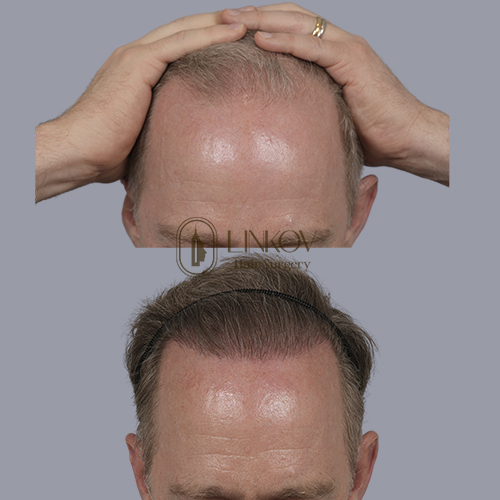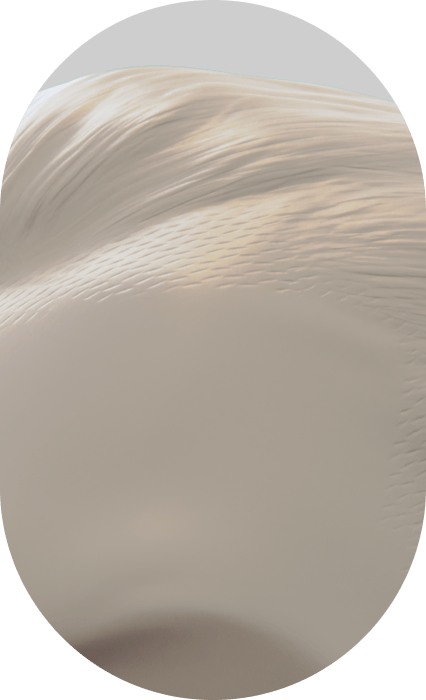Tinea Capitis
Scalp ringworm, technically called tinea capitis, earned its name because of the narrow, winding circles it creates on the head, much like a worm encircling a spot on the ground. But the similarities end there with this fungus. Seek tinea capitis treatment when you first start feeling the symptoms of pain and itching where the fungus is growing. At those first signs, don’t wait until your hair starts thinning and falling out, call expert hair restoration doctors at Linkov Hair Surgery in Manhattan for immediate relief and the best tinea capitis treatment.

What Is Tinea Capitis?
Tinea capitis, also known as ringworm on the scalp, is a fungal infection that grows in dead hair tissue. Ringworm on the scalp is caused by the formation of mold-like fungi called dermatophytes. This condition appears on scalps that aren’t regularly washed after sweating. The condition also appears around minor cuts or wounds that have been left untreated.
Scalp ringworm can be a tricky and pesky ailment, as it’s easily contagious and spreads quickly, especially among children. Signs of this fungal infection show up as circular rings of thinning or bald patches where sores have formed. These areas may be sensitive and itchy. Luckily, there are a variety of different effective tinea capitis treatment options available once it’s been diagnosed.
In New York City, Dr. Gary Linkov, an expert in treatment for tinea capitis, recognizes the condition when he sees it. Then he comes up with the best treatment for tinea capitis scalp itching at the Manhattan office of Linkov Hair Surgery. When you or any of your children discover scaly patches on the head, rely on a fast diagnosis and individualized treatment at the best price with Dr. Linkov.

What Are the Symptoms of Tinea Capitis?
Symptoms vary, but the most common and obvious sign that you need tinea capitis treatment is the appearance of circular patches of scaly hairless skin. Much like a rash, it spreads out like a web, creating areas of itchy bald spots that become painful and uncomfortable. This condition received its name after the characteristic circular patterns of sores it creates. Despite the common misconception, no actual worms are involved.
The ring-like patterns created by the fungus are the most obvious sign of ringworm. The hair around these areas becomes fragile and falls out or breaks easily. You can tell this apart from other types of hair loss in that it’s more painful and sore around the areas of missing hair. Common symptoms that may indicate the need for tinea capitis treatment include:
- Balding patches Circular areas appear where the hair has fallen out or broken off. These may appear on all areas of the scalp in no particular pattern.
- Small black dots Tiny black dots appear on the skin where the hair has broken off. These are signs of the mold living off the dead skin and hair tissue.
- Brittle hair Hair on the scalp becomes thin and easily breaks or falls out completely when combed or pulled. The hair can be affected on an entire area of the scalp even if it hasn’t developed the telltale rings.

How Can I Avoid Scalp Ringworm?
If you or your child have experienced ringworm in the past, you know to take steps to avoid contracting the irritating and difficult fungus. Because it’s highly contagious, it’s best to avoid contact with anyone who has been exposed to it or has been recently diagnosed.
Hygiene plays a big part in maintaining a healthy scalp. The fungi thrives and spreads in areas that are moist, warm and untouched — spots vulnerable to germs. Washing your hair and scalp regularly cleans the scalp of any potential fungus that’s begun to grow. Your NYC hair restoration doctor recommends steps to take to protect you and your child from ringworm on the scalp, such as:
Practicing good daily hygiene Keeping the scalp clean and dry protects it from becoming infected and vulnerable to fungal growth.
Not sharing combs and hair products Because it’s so contagious, ringworm can live in the dead tissue left behind on combs and brushes, berets, hair picks and bobby pins. The fungus can also live in the skin left on material, so it’s wise to avoid sharing hats or helmets, especially with strangers and large groups.
Avoiding contact with pets who aren’t groomed properly Many household pets like dogs and cats can carry ringworm undetected. Many cases of infantile tinea capitis are due to exposure to infected cats and dogs.
Washing bedding frequently Pillows, sheets and blankets should be kept clean and dry to avoid transferring a fungus to the scalp while sleeping.
What’s the Best Treatment for Tinea Capitis?
Treatment for tinea capitis scalp is most commonly done with an oral antifungal medication taken for anywhere from one to three months, depending on the condition. Fungal treatment on the body is treated differently, depending on where it’s located. Anti-fungal shampoos, topical creams and ointments are available to relieve the itchiness and soreness of the infected bald spots, however, the oral medication also is necessary and most effective for scalp ringworm.
At Linkov Hair Surgery, your top doctor examines and diagnoses the area and prescribes treatment specific to your case, providing you with the quickest, most effective relief possible. Tinea capitis treatment may include:
Griseofulvin This is an oral medication taken for ringworm one to four times a day, depending on the severity of the fungal infection.
Terbinafine This medication comes in tablet form or cream. It’s safe for children and especially effective as treatment for tinea capitis scalp conditions.
Prescription-strength medicated shampoos The best doctor usually recommends medicated shampoo to protect the healing skin and act as a sensitive cleanser of areas that may still be sore and painful.
Why Does Scalp Ringworm Occur Most Often in Children?
Although people of all ages can contract tinea capitis, it most commonly appears in pre-pubescent children between the ages of three and 14. Ringworm attacks weaker immune systems, which isn’t limited to children, although they’re more susceptible to contracting it. Most commonly, the fungal infection is due to early exposure to pets that aren’t kept clean.
Implement good hygiene practices with your children at a young age. Wash and care for the scalp regularly. Treat small cuts and wounds to the scalp with antibacterial ointment immediately and bandage them to prevent infection. Report outbreaks of tinea capitis in daycare centers and schools immediately to parents who can take preventative actions or seek tinea capitis treatment.
In Manhattan, contact the experts at our hair transplantation center to find out if you or your kids have contracted the fungus, so that you can begin treatment as soon as possible and avoid long-lasting consequences.
Linkov Hair Surgery
150 E 56th St, #1A
New York, NY 10022
(212) 970-9404

